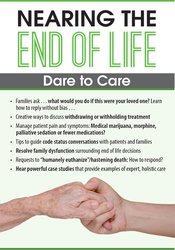

Eleanor is an 83-year-old widowed lady with known chronic heart failure and advanced dementia. She is now hospitalized with a significant stroke and dysphagia. She does not have a healthcare directive and had never discussed what she would want, other than staying at home until she dies. She is full code. Her family still wants resuscitation attempted. Her children admit they are concerned about what is best for their mother.
What are options for Eleanor and her family? Would she benefit from artificial hydration and nutrition? How is she going to receive medications? Can some of her medications be discontinued? Who is going to be her caregiver?
In this compelling seminar, multiple case studies like Eleanor’s will provide you with examples that you can incorporate when care is more important than cure. To deliver expert, holistic care, healthcare professionals need to have a toolbox full of new interventions to promote quality care at the end of life.
Have you ever been asked, “what would you do if this was your family member?” Learn conversation options to use while staying neutral.
Did you know that a patient might enroll on hospice care and be a full code? We will discuss how this is done.
What can we do for patients seeking euthanasia who see this as the best solution? These situations are becoming more frequent. Anticipate how you will respond.
Strategies regarding comfort, communication, choices and control have unique issues and challenges for patients, families and health professionals. We have an obligation to know how to help provide emotional, spiritual, existential, and physical comfort for those who have life-limiting conditions and to support them through difficult decisions. It’s time to think outside the box.

Nancy Joyner, RN, MS, APRN-CNS, ACHPN® is a nationally recognized consultant, speaker, educator and author. As a Palliative Care Clinical Nurse Specialist, she works as the palliative care specialist disseminating awareness and education regarding palliative care statewide. Nancy has over 40 years of nursing proficiency that includes 17 years as an advanced practice nurse in palliative care. Nancy is an End-of-Life Nursing Education Consortium (ELNEC) trainer. She has had training through the Center to Advance Palliative Care (CAPC). Nancy created numerous CME sessions on palliative care for the University of North Dakota’s Project ECHO and is involved with the Dakota Geriatric Workforce Enhancement Program. She has presented and published at local, state, and national levels. She has researched and published articles on POLST and advance care planning. Nancy is an ambassador for the Serious Illness Community of Practice, Ariadne Labs. She is currently president of Honoring Choices® North Dakota, North Dakota’s POLST Program Coordinator and co-creator of the HCND ACP Facilitator Certification Course.
Speaker Disclosures:
Please wait ...